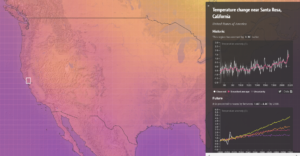The need is dire: levels of CO2 already in Earth’s atmosphere and added daily are destabilizing established climate patterns and damaging the ecosystems on which all human settlements and other living beings depend.

Interactive graphic from Carbon Brief estimates to-date and projected additional temperature rises for Earth’s 64,800 “grid cells,” each 100 km wide. Data shown are for Santa Rosa, CA, site of recurring disastrous wildfires. See link in text to access other areas.
The damages are accumulating and accelerating. The British consultancy Carbon Brief recently published an interactive graphic showing the extent to which every section of Earth’s surface has heated to date and is projected to grow even hotter over this century. The graphic reveals the amount of global heating in “your” area, yet it only hints at the extent of wildfires, hurricanes, drought, extreme weather and ecosystem collapse resulting directly from planetary heating. The same can be said of a 2020 report from the Environmental Defense Fund that calculated a 4-fold increase in the annual cost of U.S. fires, tropical storms, floods, droughts and crop freezes attributable to climate change. (Inside Climate News had a useful summary.)
Very large and rapid reductions in the United States’ and other nations’ carbon emissions are essential to avoid runaway climate destabilization and minimize severe weather events, inundation of coastal cities, spread of diseases, loss of forests, failure of agriculture and water supply, infrastructure destruction, forced migrations, political upheavals and international conflict.
A robust tax on carbon pollution will create powerful incentives inducing policy-makers and individuals to reduce carbon emissions through conservation, substitution and innovation.
Currently, the prices of electricity, gasoline and other fuels reflect little or none of the long-term costs from climate change or even the near-term health costs of burning fossil fuels. This immense “market failure” suppresses incentives to develop and deploy carbon-reducing measures such as energy efficiency (e.g., high-mileage cars and high-efficiency air conditioners), renewable energy (e.g., wind turbines, solar panels), low-carbon fuels (e.g., biofuels from high-cellulose plants), and conservation-based behavior such as bicycling, recycling and overall mindfulness toward energy consumption.
Taxing fuels according to their carbon content will infuse these incentives at every link in the chain of decision and action — from individuals’ choices and uses of vehicles, appliances, and housing, to businesses’ choices of new product design, capital investment and facilities location, and governments’ choices in regulatory policy, land use and taxation.
A carbon tax won’t stop global climate disruption by itself — other, synergistic actions are required as well. But without a carbon tax, even the most aggressive regulatory regime (e.g., high-mileage cars) and “enlightened” subsidies (e.g., tax credits for efficiency and renewables) will fall woefully short of the necessary reductions in carbon burning and emissions. (For analysis driving that point home, see the 22-page comments, “Design of Economic Instruments for Reducing U.S. Carbon Emissions,” that we submitted in January 2014 to the Senate Finance Committee; or read our post summarizing those comments.)
